Internetting Better
How cheap money and algorithms shaped the last decade and the opposite will shape the next
This is a powerful read for people trying to mentally tie a bow on the 2010s. Ranjan wraps it up saying that the cheap money thanks to near zero interest rate policies we’ve had since the GFC, and social media algorithms, are what shaped the last ten years of our lives.
“I’m incredibly excited about the coming decade because I am genuinely hopeful the two core trends I outlined will be reversed.
Algorithmically-optimized lying has prominently entered the conversation to the point our ex-President was kicked off. There’s simply no way money can remain this cheap for a prolonged period of time. What that unwind looks like is an entirely separate post, but there will once again be discipline imposed on the allocation of capital. Financial and technological regulation is far more imaginable than just a few years ago. Change is coming.”
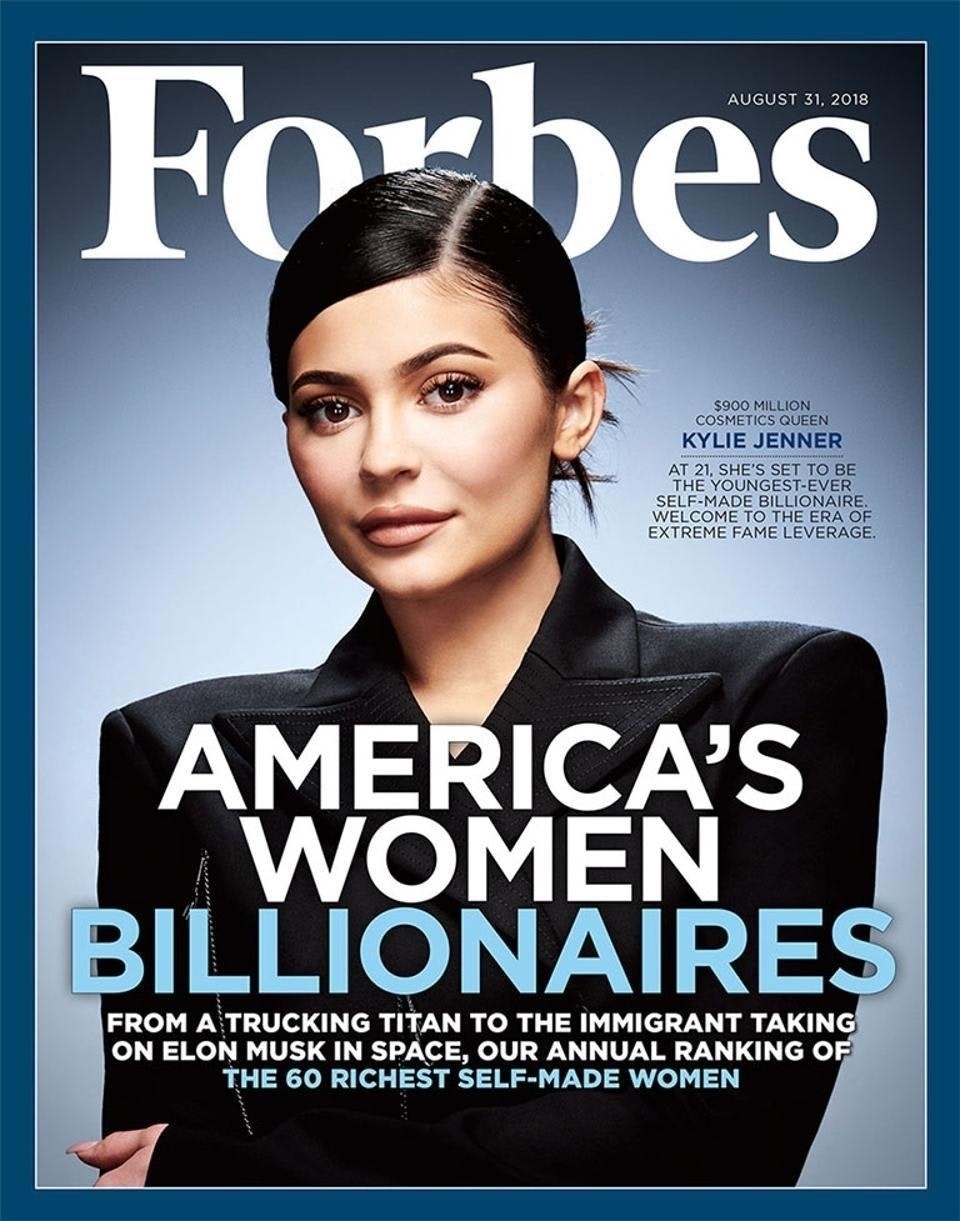
I’m two days deep Clubhouse and I’m feeling bullish about its potential.
It’s a powerfully personal medium, with deep accountability (live voice). It’s like the child talkback radio and social networking.
I’ve got one invite left if you’re interested.
Feature request for iMessage, Facebook Messenger, Instagram DMs, and Facebook Page Messenger: FOR THE LOVE OF GOD LET ME SEE UNREAD MESSAGES SO I CAN “READ” THAT ONE UNREAD MESSAGE WHICH I CAN’T FIND ANYWHERE. Maybe a simple “filter by unread” or somethn?
‘Nice’ doesn’t sell ads
I’ve found the most quotable book I’ve read in a while.
“Imagine for a moment that a new drug comes on the market. It’s super-addictive, and in no time everyone’s hooked. Scientists investigate and soon conclude that the drug causes, I quote, ‘a misperception of risk, anxiety, lower mood levels, learned helplessness, contempt and hostility towards others, and desensitization’. Would we use this drug? Would our kids be allowed to try it? Would government legalise it? To all of the above: yes. Because what I’m talking about is already one of the biggest addictions of our times. A drug we use daily, that’s heavily subsidised and is distributed to our children on a massive scale. That drug is the news.”
Ruther Bergman’s book Humankind was recommended to me by my Aunt over Christmas as we talked about the light subject of saving the planet and bringing peace to planet earth.
Tracey recommended the book and in the first chapter Rutger is straight in for the attack on the news.
“I was raised to believe that the news is good for your development. That as an engaged citizen it’s your duty to read the paper and watch the evening news. That the more we follow the news, the better informed we are and the healthier our democracy. This is still the story many parents tell their kids, but scientists are reaching very different conclusions. The news, according to dozens of studies, is a mental health hazard. First to open up this field of research, back in the 1990s, was George Gerbner (1919–2005). He also coined a term to describe the phenomenon he found: mean world syndrome, whose clinical symptoms are cynicism, misanthropy and pessimism. People who follow the news are more likely to agree with statements such as ‘Most people care only about themselves.’ They more often believe that we as individuals are helpless to better the world. They are more likely to be stressed and depressed. A few years ago, people in thirty different countries were asked a simple question: ‘Overall, do you think the world is getting better, staying the same, or getting worse?’ In every country, from Russia to Canada, from Mexico to Hungary, the vast majority of people answered that things are getting worse. The reality is exactly the opposite. Over the last several decades, extreme poverty, victims of war, child mortality, crime, famine, child labour, deaths in natural disasters and the number of plane crashes have all plummeted. We’re living in the richest, safest, healthiest era ever. So why don’t we realise this? It’s simple. Because the news is about the exceptional, and the more exceptional an event is – be it a terrorist attack, violent uprising, or natural disaster – the bigger its newsworthiness. You’ll never see a headline reading NUMBER OF PEOPLE LIVING IN EXTREME POVERTY DOWN BY 137,000 SINCE YESTERDAY, even though it could accurately have been reported every day over the last twenty-five years. Nor will you ever see a broadcast go live to a reporter on the ground who says, ‘I’m standing here in the middle of nowhere, where today there’s still no sign of war.’”
With a careful note on journalism versus the news:
“Of course, by ‘the news’ I don’t mean all journalism. Many forms of journalism help us better understand the world. But the news – by which I mean reporting on recent, incidental and sensational events – is most common.”
And then he slides right into Facebook and Silicon Valley’s current obsession with buying and retailing our attention.
“This modern media frenzy is nothing less than an assault on the mundane. Because, let’s be honest, the lives of most people are pretty predictable. Nice, but boring. So while we’d prefer having nice neighbours with boring lives (and thankfully most neighbours fit the bill), ‘boring’ won’t make you sit up and take notice. ‘Nice’ doesn’t sell ads. And so Silicon Valley keeps dishing us up ever more sensational clickbait, knowing full well, as a Swiss novelist once quipped, that ‘News is to the mind what sugar is to the body.’
I believe that ‘Humankind: A Hopeful History’ by Rutger Bregman is required reading for anyone who’s upset, angry, our generally uncomfortable about the state of our people entering 2021.
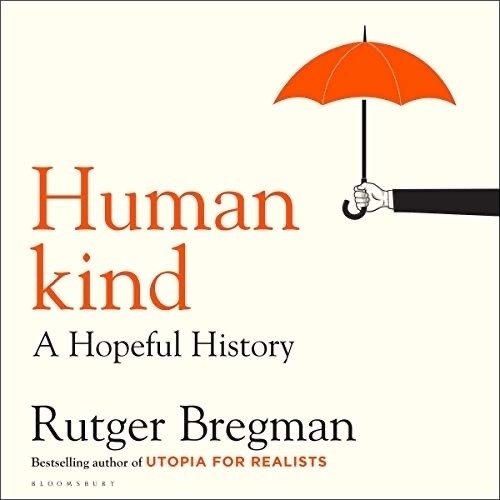
How to overcome Phone Addiction [Solutions + Research]
“Phone addiction is one of the biggest non-drug addiction in human history. Studies show that excessive phone use is linked to procrastination, suicide (example), spoilt sleep, food and water neglect, headaches, lower productivity, unstable relationships, poor physical health (eye strain, body-aches, posture, hand strain), and poor mental health (depression, anxiety, stress). Some of these problems can be both causes and effects of phone addiction (procrastination, anxiety, unstable relationships, etc.).”
The book 1984, but instead of Big Brother, it’s Facebook.
Simon Owens on 'the Substack problem'
“2021 will be the year that publishers start to form strategies to deal with the Substack Problem. By that, I mean they’ll need to find ways to discourage their star writers from leaving to launch their own Substack newsletters. In the most likely scenario, they’ll make deals with writers to launch the newsletter under the banner of the media company. They might structure the deal so the writer gets to keep their current salary and then some percentage of the subscriber income they generate – similar to the advances and royalties that book publishers dole out. This will be enticing to the writers because they get to maintain job security while also benefiting directly from their success. They can also grow their audience much more quickly with the help of the media company. It’s a win win for both parties.”
Simon Owens, on his Substack, which I highly recommend subscribing to
My issue with Spotify and Amazon muscling in on podcasting and how Apple has failed as well
Life on the internet, and in podcasting, is a game of middlemen (middlepeople?). The middlepeople actually really benefit from being in the middle, more than we imagine, and it’s an easy position to hold, one that most of the middlepeople hold in secret. Spotify is muscling it’s way into becoming the middle person between you, your favourite podcast, and the 246 companies that receive that data. Meanwhile big-spending Amazon is muscling it’s way into our listening habits, and even my podcast app of choice, Overcast, is a middleperson by design in that the Overcast servers know what podcasts I listen to, and those servers are continually polling the different podcast servers.
Spotify and Amazon I take issue with because they want to put a toll booth, even if it’s a free toll booth, on an already open road. Overcast is operating a booth on the road, but it’s not taking a toll. Whilst all of that is going on, the original champions of the podcast space, Apple Podcasts is - more than possiblly unknowingly - oversharing to the nth degree about who is driving on the free road, and I feel like that sharing needs to be reduced.
Algorithms are destroying our communities and what can we, or I, do about it?
There needs to be a better way to Internet
Maybe it’s because 2020 gave me many opportunities to think through the implications of which technology companies I’m quite beholden too, or maybe it’s because 2020 brought to light so many of the unhealthy business practices so many technology companies are embroiled in, but I’ve been trying to make big changes in my lifestyle in response to either, or both - because I believe that tech company algorithms are destroying marriages, friendships, families, and communities. I believe our privacy is important.
Social Media
I find so much connection and joy in the social elements of the web today, be it Facebook or Instagram, Twitter or YouTube, but I’m increasingly aware that anything more than a passing view into any of these portals is unhealthy for my soul, and an increasingly unhealthy place to “spend my data.”
I feel less and less comfortable with having my friendships, interests, politics, faith, and philosophy influenced by algorithms.
There’s a real tension here because I enjoy publishing and broadcasting stories - my own, my family’s, my friend’s, and the stories in my greater circle of life - plus I love listening to and reading your stories.
There’s just an inherently unhealthy aspect to a non-human deciding what you should hear about from your community.
Podcasting
I have a 25 year love story with the audio storytelling medium. It was 1996 when Paul McDermott, Mikey Robbins, and the Sandman were on Triple J for Breakfast and I feel in love with the idea of telling stories and entertainment purely through audio - no pictures, no words, no video.
As we skipped into a new millennium Dave Winer invented really simple syndication, RSS, and Adam Curry and Cameron Reilly started making podcasts, I witnessed the democratisation of audio away from broadcast radio despite forming and then walking away from a career in the artform.
Today as I witness Spotify and Amazon work hard at putting podcasts behind data-collecting, algorithm-driven, firewalls I honestly feel sad for the loss of the open industry of podcasting. I’m not saying all podcasts should be free. I personally pay for a number of podcasts, I’m just saying we should be able to access them without sacrificing personal freedoms, liberties, and without sharing excesses of personal data like what podcasts I listen to, which ones I listen all the way through, and the ideas algorithms can derive from that data.
Our entertainment and our information should be democratically available and curated by people, not by algorithms.
News, information, and articles
If you search on Google today for “The first podcast” you’ll see Google News articles for Prince Harry and Meghan Markle’s first podcast episode.
Our news and information, our thought-pieces and studies, our stories and anecdotes deserve better than being submitted to an algorithmic in the hopes that the mathematics decide they’re worth being read.
Communication
I don’t like the idea of the algorithms feeding me news, information, funny videos, and podcasts, to also be reading my messages and communications between people I love.
Photos
I have so much love for the art of photography. I would love you to enjoy my photos, and even more so I’d love to enjoy your viewport to the world. Maybe some of mine can hang on your wall as art, and vice-versa.
But I don’t want Facebook, Google, and Amazon to degrade that experience, and worse, abuse it for their own data-gathering needs about where we all were, and what we did.
Hardware
I don’t use Google Android phones because I don’t trust Google to run an operating system I could trust, and I use Apple computers because of the opposite, I enjoy knowing that my data is mostly processed locally - not in a data-overlord’s cloud. It’s an expensive choice, but until I know any better, I’m using Apple computers and mobile phones.
Entertainment
So many TVs today are selling our viewing data to advertising companies, and purely because Amazon and Google’s names sre in the product title, the Chromecast and Fire sticks are products I don’t trust.
The fix?
I’m leaning back into the open web, reading blogs on people’s own websites like mine where you’re reading this to hear my friend’s and family’s stories, listening to open podcasts that are available to whoever would like to listen to them, articles and news organisations. I’m communicating via phone call, iMessage, and email - not via comment fields and discussion boards, or if I am commenting and replying to posts I want to do it on a social network whose business model is clear and open, like Micro.Blog. Instead of waiting for entertainment, information, news, and articles to be recommended by an algorithm, I would like to see it in my RSS reader, or even better, see you link to it from your blog, and if I want you to read it, I can link to it from mine. I’m taking my photos back from Google and Facebook and sinking them deep into Apple Photos because I feel like I can trust them to be stored safely and enjoyed beautifully there.
I’m not insisting that my choices are the only and best, but with what I know today, and with the resources I have, and what I’d like to do and enjoy, I think these are pretty good choices.
Why should we care?
I’m writing all this so I might encourage you to come with me. I love the idea of us not talking over Facebook Messenger, and finding out about your pregnancy via an Instagram Story. I relish the idea of you listening to a podcast and thinking I might enjoy it so you share it with me. I dream of a day where local news and information is broadcast and published without fear of it not performing well in the news feed or without generating enough advertising revenue.
I hope for a day where the internet and our relationships live harmoniously - not in fear of each other.
We might never get there, but we can try.
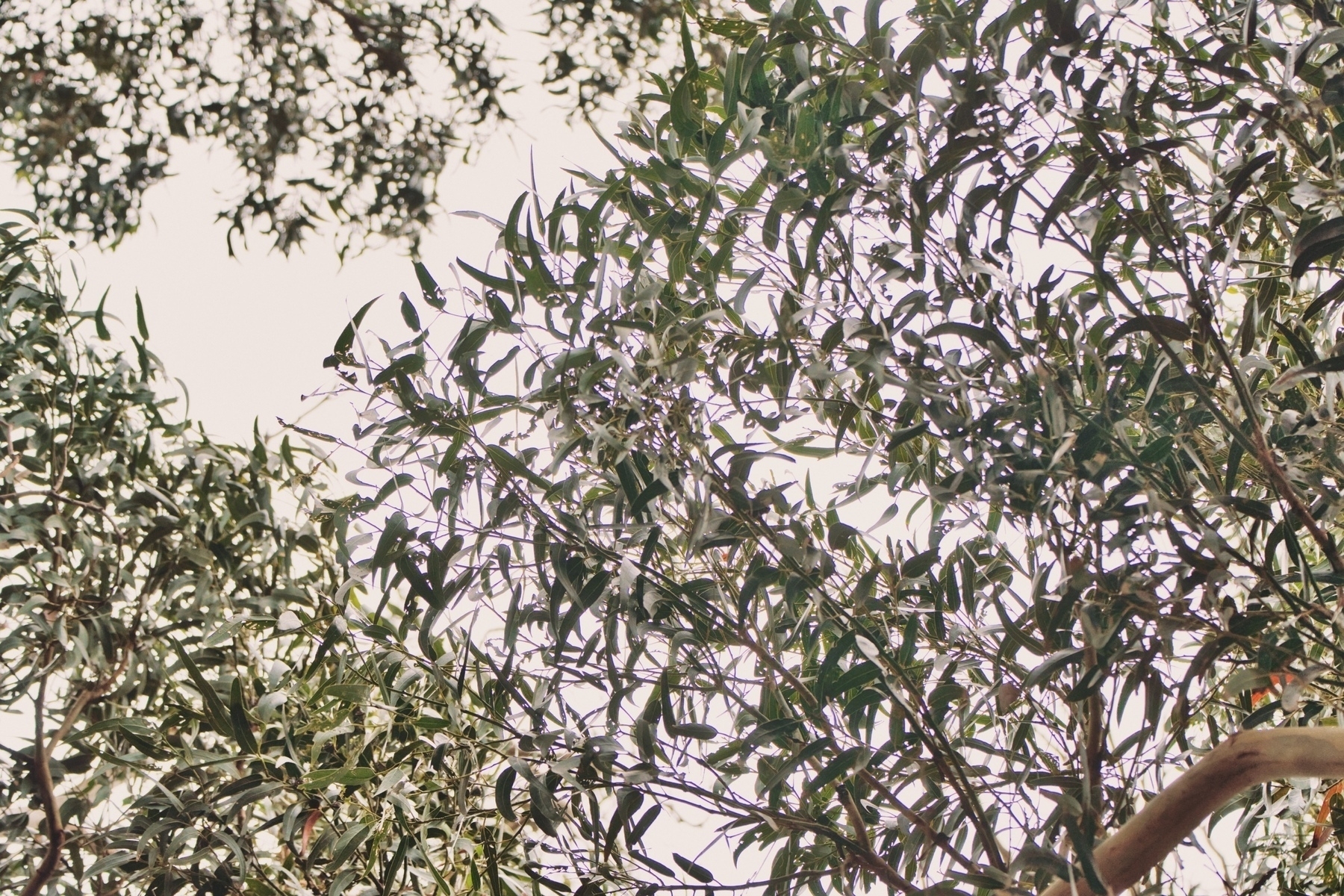
A new family and travel photo workflow
For my personal travel and family photos, I’ve started a new photos workflow, and I thought other people who are beginning their family photo journey like I have in the past few years might be interested.
The premise of the workflow is that photos begin on my iPhone, Britt’s iPhone, or my Sony A6400. They are processed, and then iCloud Photo Library is my one true family photo library.
I’ve put loads (months) of work into clearing and culling that library down to about 21,000 photos now, and just recently finished geotagging every single last photo in the library using Metapho.
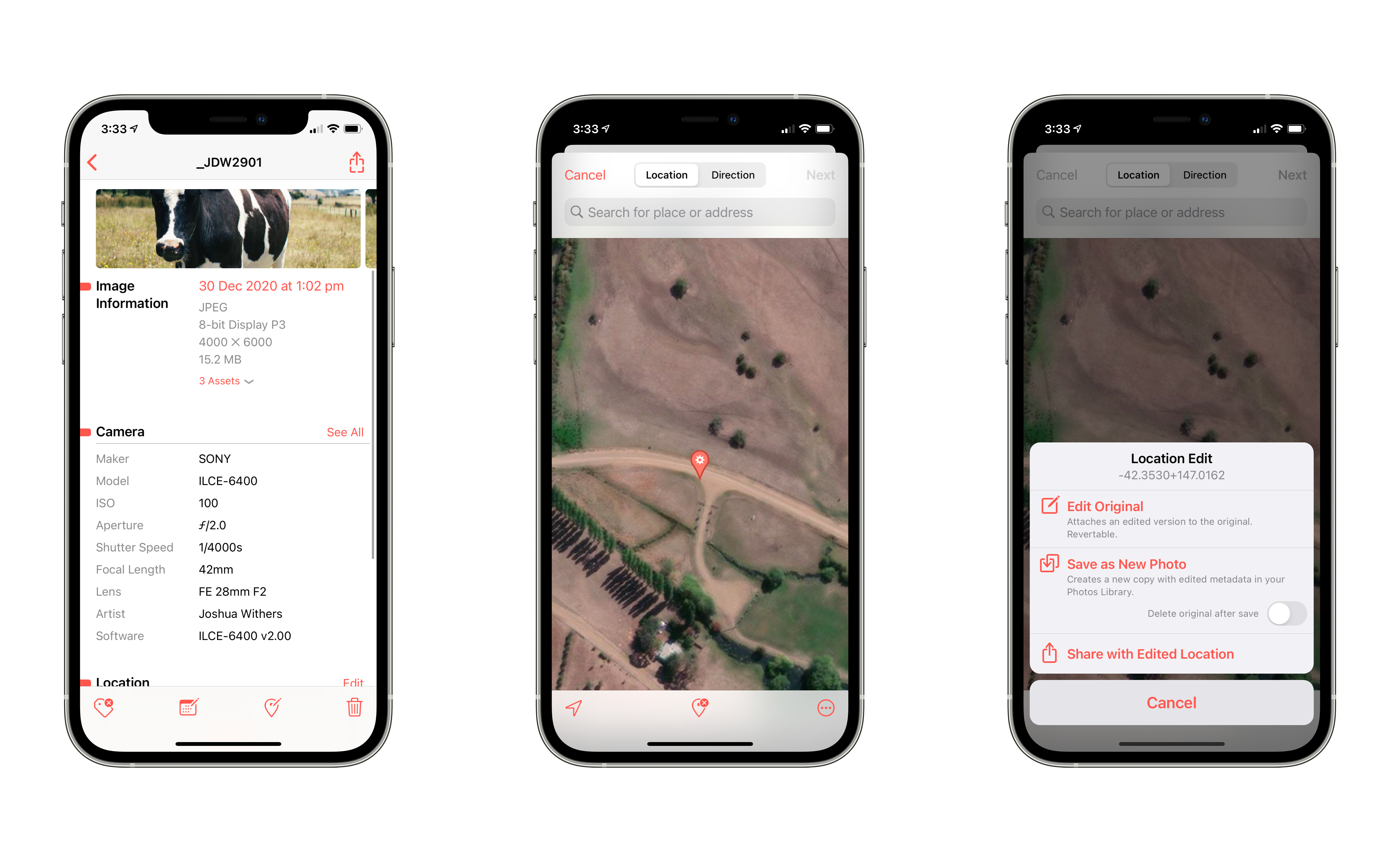
Because I like the idea of capturing as much data as possible so I have wiggle room afterward, I shoot on my iPhone and Sony A6400 in RAW, and previously I’ve used Lightroom to process photos then export to Photos. Recently however I’ve moved processing to Darkroom. I wasn’t comfortable with paying for Lightroom CC storage, and then having to make decisions about keeping originals either on a hard drive, or to increase my subscription and size for Adobe’s Cloud, so I’m keeping them in Apple’s iCloud - a product I already use and pay for.
The workflow simply looks like this:
1. Import: I import the photos to my iPhone’s camera roll. If I’ve already taken photos on my phone, they’re there. I ask Britt to Airdrop her photos to me. For photos from my camera I have the Apple Lightning to SD Card adapter, and import the raw DNGs straight into the camera roll.
2. Cull: I delete photos I don’t think I’ll keep. They stay in the Apple Photos deleted items for 30 days, more than enough time for regret to realise itself, or for me to realise I never needed those photos anyway.
3. Process: I open Darkroom and because I’ve got access to my Photos library within Darkroom I can edit these new photos as I like. Darkroom has some great inbuilt presets and you can build your own as well.
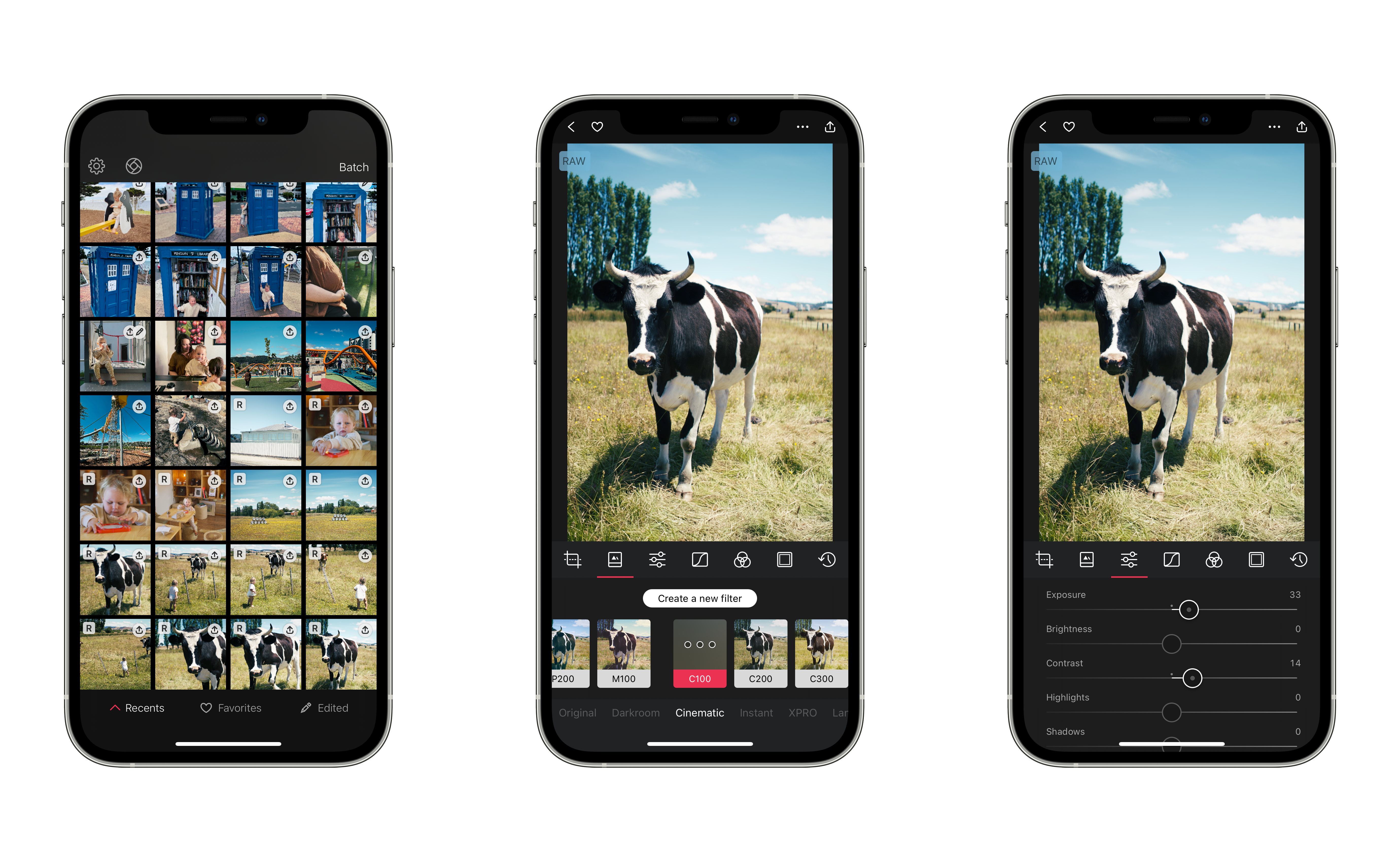
4. Modify Original: Once I’m happy with the crop, straighten, clour grade, edit, and what-not within Darkroom this is the impotant step. In the top right hand corner is the share icon, and I choose “Modify Original” so that the adjustments are stored inside the image file. It’s actually not stored inside, it’s essentially a little zip file, with the .ARW raw DNG file from the camera, a .plist file with the adjustments made in Darkroom, and then a rendered .JPG which is the image we all see, share, and enjoy. This means that there is a package in the iCloud Photo Library which containts those three files, totallying 40.4MB, instead of maybe 15.2MB. I don’t know why this is important to me apart from my inner burning knowledge that once data is gone, you don’t get it back.
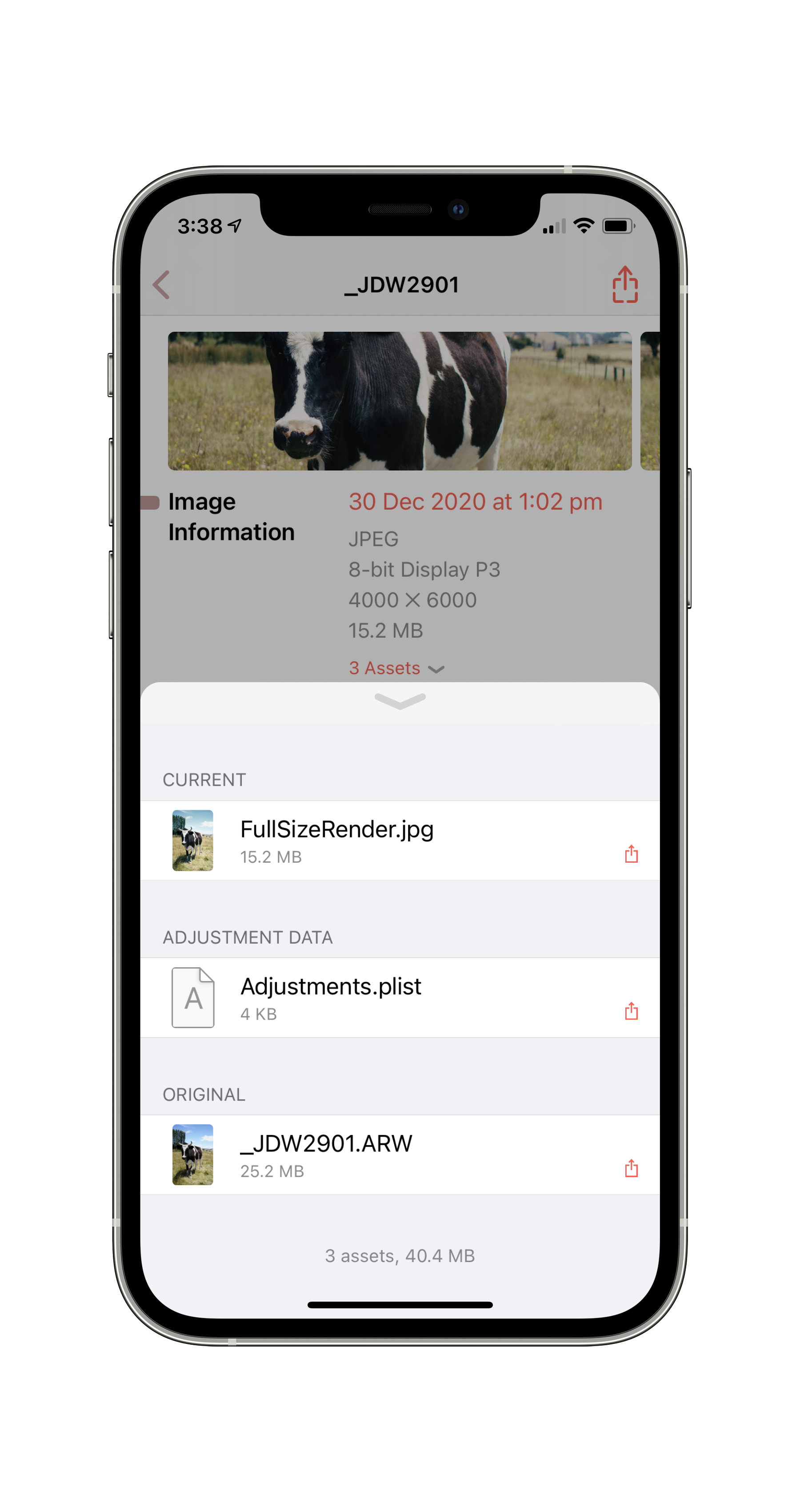
5. Location, location, location: Aside from the image itself, there are three pieces of metadata important to me. The first is the location, the geotag. I love how Apple Photos brings you memories inside the Photos app, and also on my homescreen using the new iOS 14 Photos widget, and those memories are often location related. So I use Metapho as discussed at the top to assign a geotag to every photo that doesn’t have one. Metapho is smart in that it looks at images shot at the same time and date and tries to help by pivoting off that data. Photos taken on my iPhone generally already have a geotag, and photos taken on my Sony might be geotagged if the terrible Sony Imaging Edge app was working that day. Images taken inside often have a slightly incorrect geotag as well, because GPS doesn’t work in the house, so I’ll correct those images.
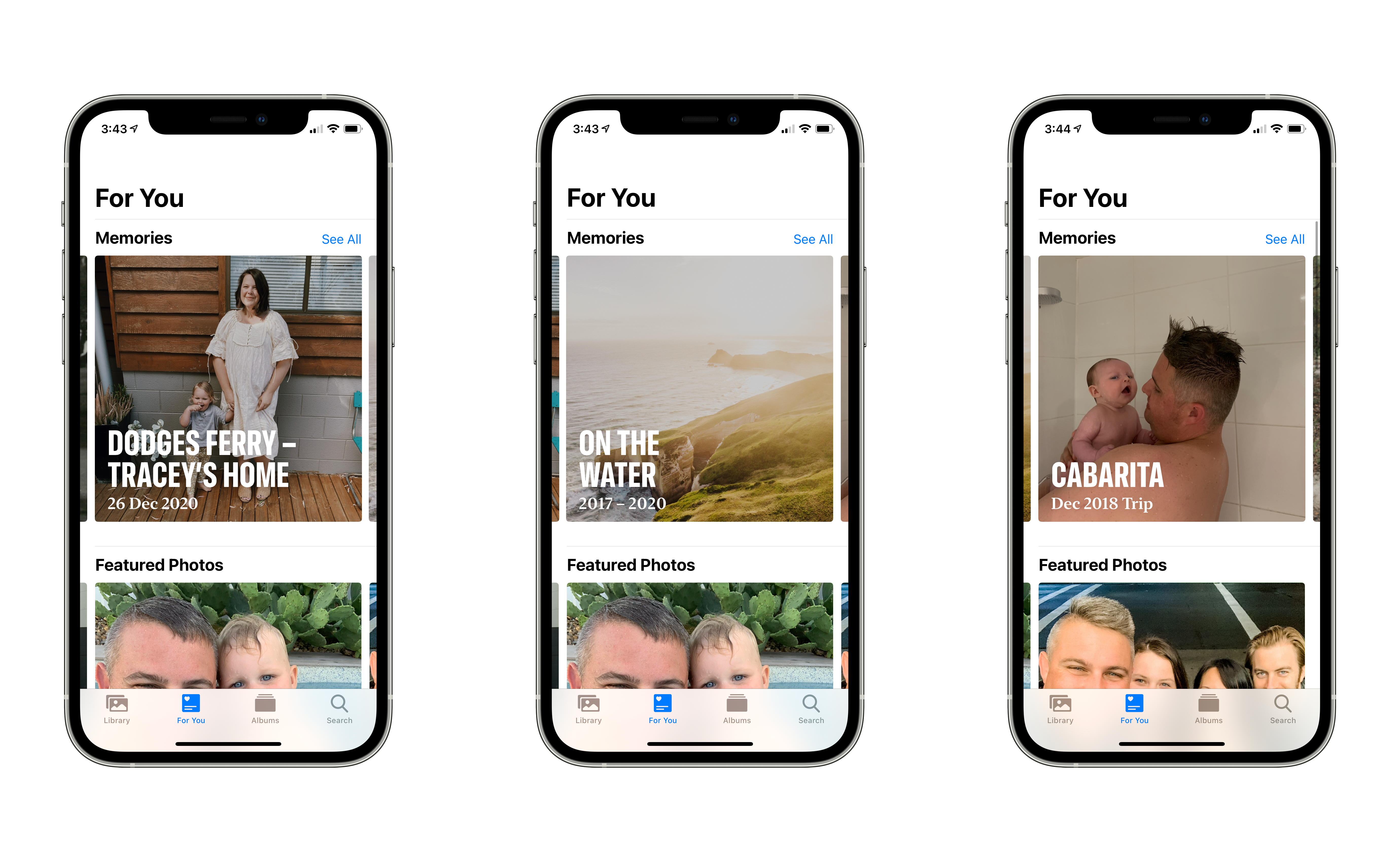
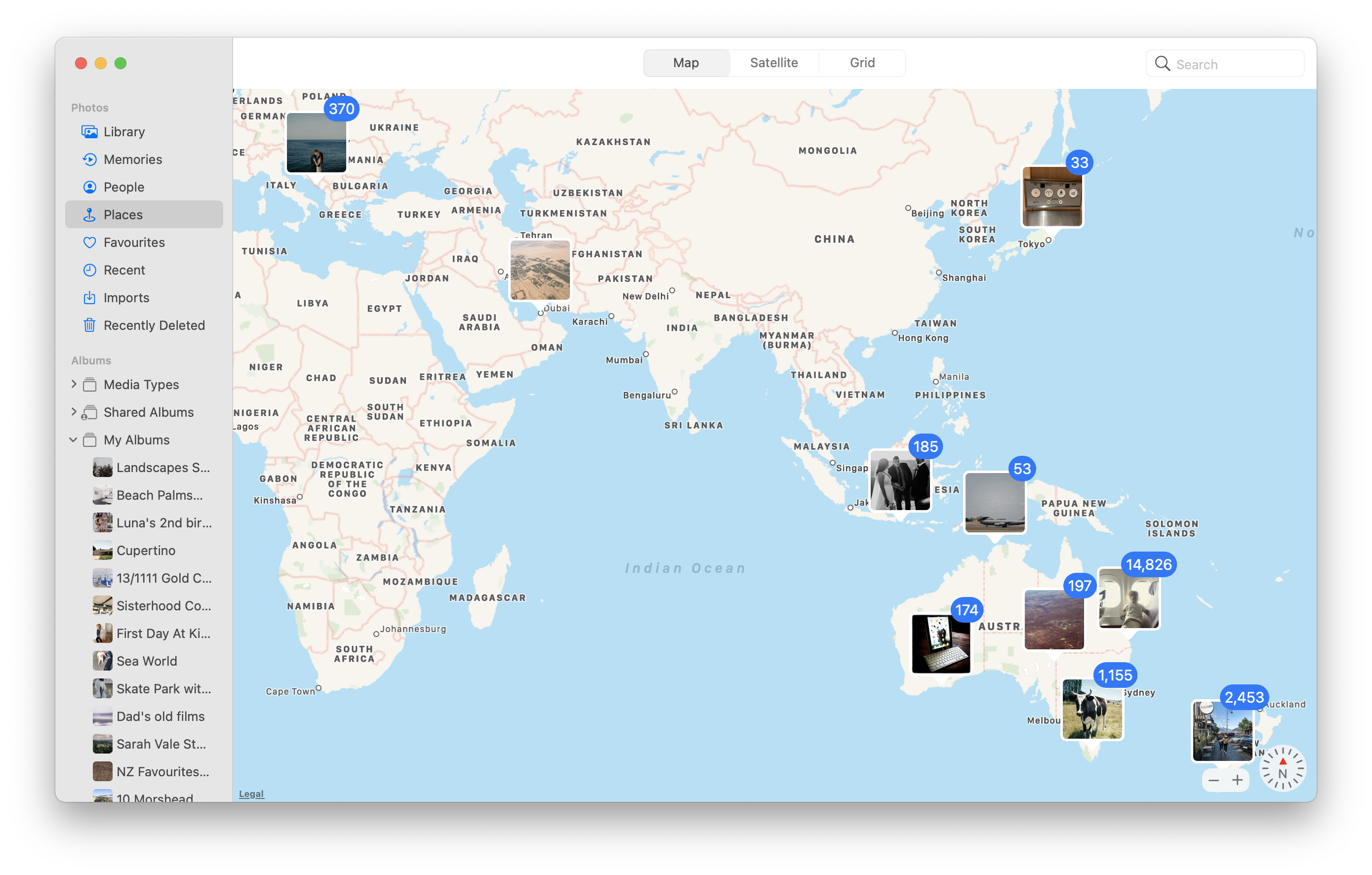
6. Who’s in the photo?: This step needs some time, because your iPhone literally needs to be plugged in, and in sleep mode, generally overnight, sometimes for a few nights. The process is about allowing Apple Photos to read your photos and detect faces. This all happens on device and at its own pace. I’ll go back to photos and see what faces have been detected and I’ll assign, or re-assign, the person name to that face so I could then search for photos of someone and find all of those photos in once search. This also adds into the memories feature. If Apple Photos hasn’t detected a face after a few days and I’m feeling pedantic, I’ll open Photos on my MacBook and in the Get Info window you can add faces manually.
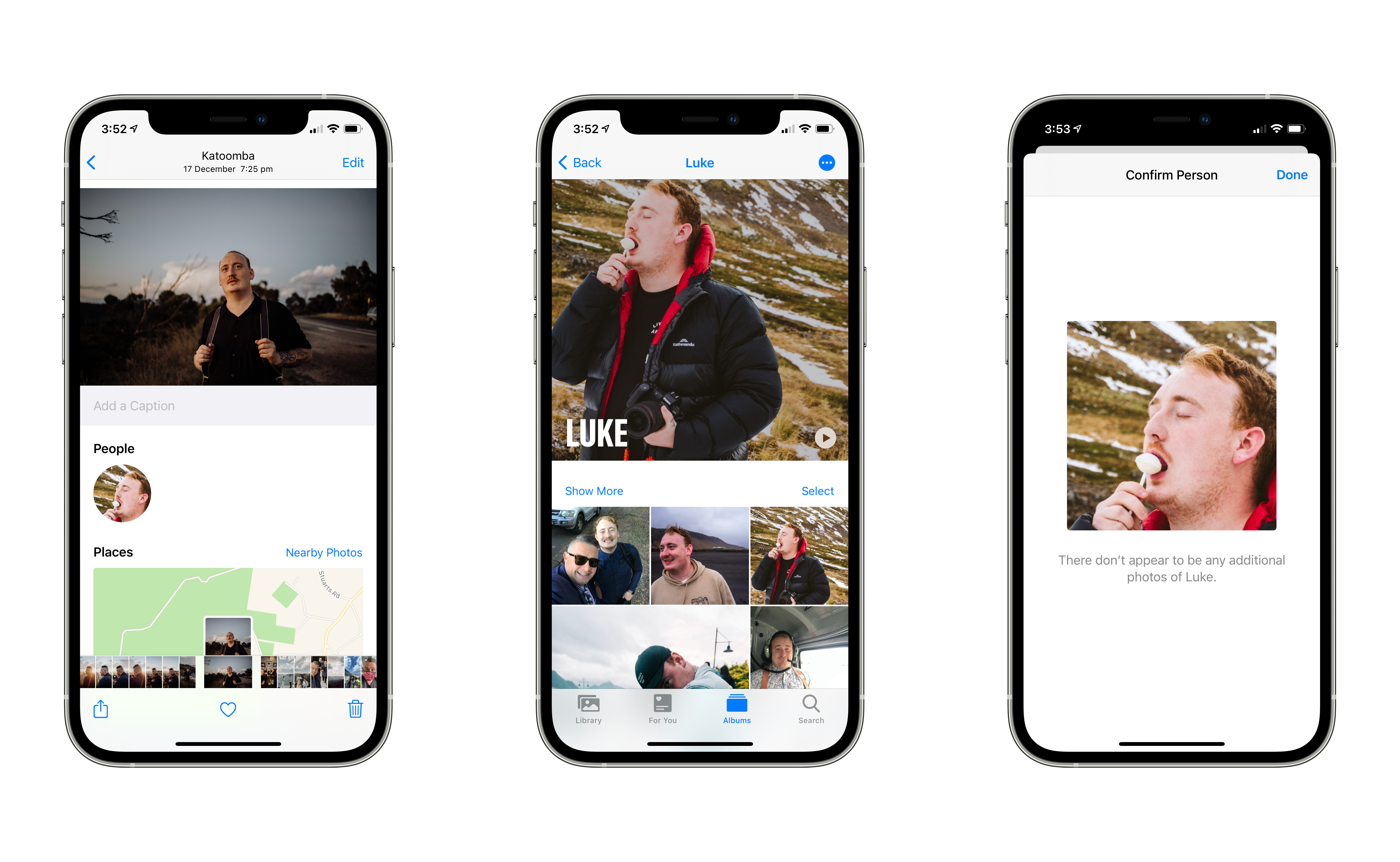
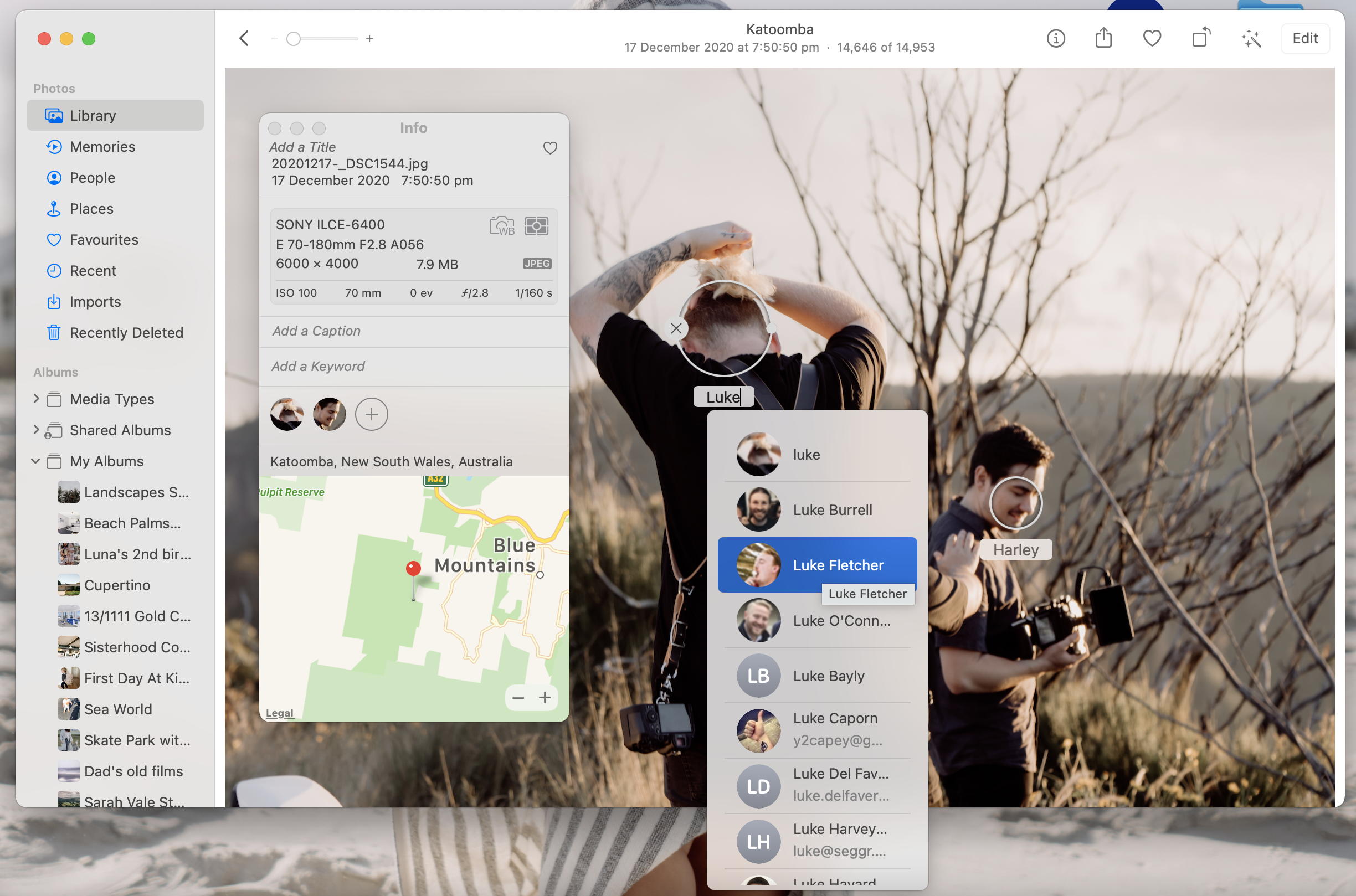
7. Captions and Albums: I’ll be honest, I have been lazy in this arena, but my goal is to caption photos accordingly, and if possible to also group them into manual albums based around events.
8. What if they’re professional photos?: We take as many opportunties as we can to have our photos taken professionally, and those photos are often delivered weeks later, often with not-correct date or time information, and with no geotag. I’ll import all of these photos to my Apple Photos app and manually correct date, time, and geotag using Metapho.
9. Backup: A final and important step is to make sure that Apple Photos on your device, and iCloud Photo Library in the cloud isn’t the only place these photos exist. You always need a backup. Mine is Google Photos - which I regret - and also in Backblaze. Ideally I’d have a physical backup but I’m just not there yet. A really good backup is to also print the photos. You’ll never regret hanging them on a wall or having the prints available to thumb through, like this photo of me as a toddler hanging at my aunty’s house.
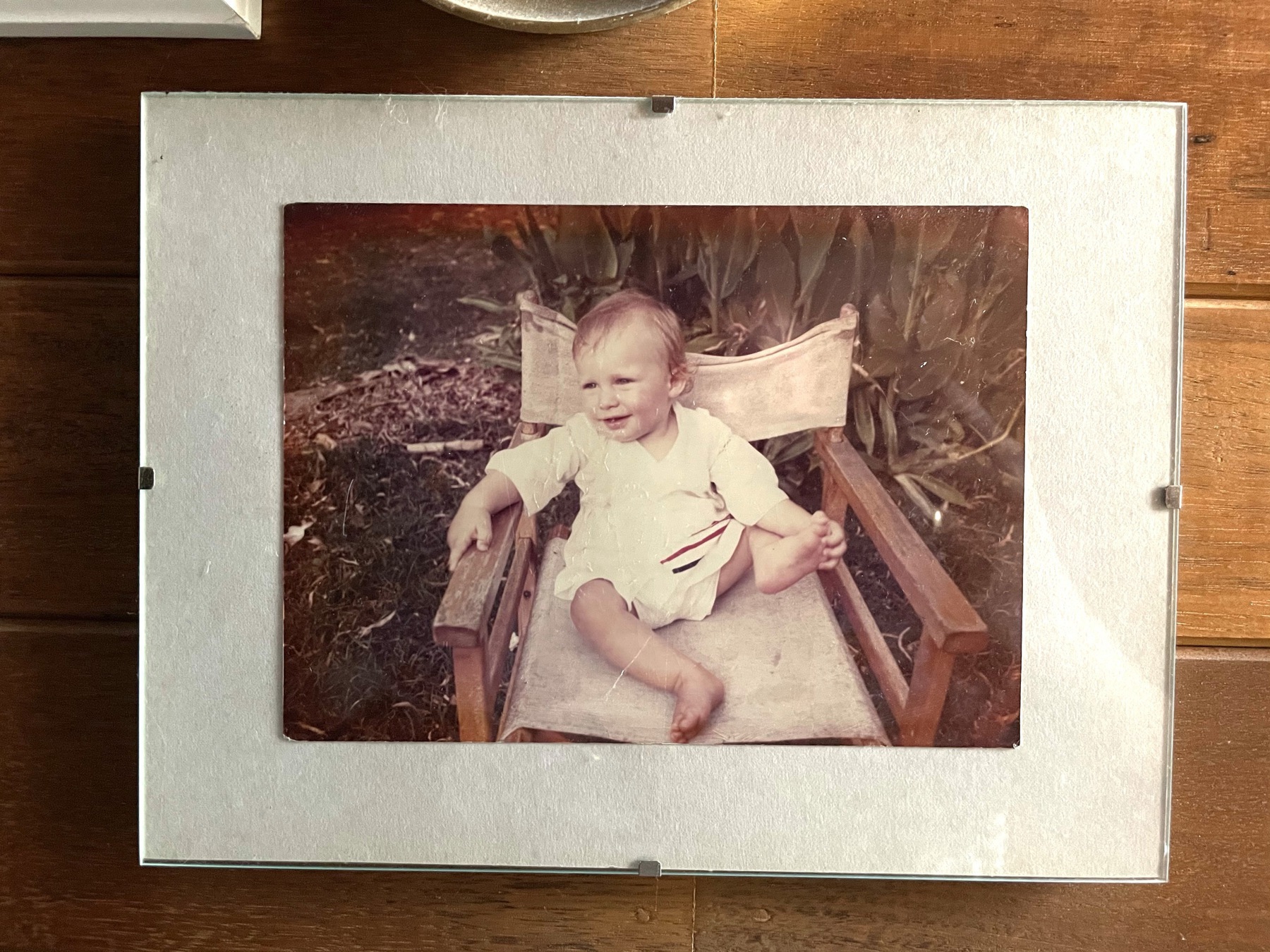
I hope this helped you formalise some sort of photo workflow for your own family and travel photos. It might not seem important today, but I can’t kick the feeling that in 30 years time it will really matter.
2014 article on ‘Silicon Valley data’ being the new ‘Wall Street debt’
“Built by geniuses, both products end up being deceptively cheap, morally corrupting, and of questionable long-term economic utility.”
My personal answer to this thought is that I’m barely “on Facebook.” I publish any and all thoughts, opinions, photos, et cetera, to my personal blog which is managed and published here on Micro.Blog, a social network that is beautiful in nature and inherently keeps my data personal. It’s business model isn’t sharing my personal data, it’s business model is to be a social networ, and it costs $5 a month, because if something is free you’re not the customer, you’re the product being sold.
The Damage Has Been Proven, So Why Are We Still on Facebook?
“If a host of reports, studies, articles, commissions of inquiry, books and films were produced about the dangers inherent in the use of a certain product – let’s say a medication or an automobile – the likely result would be a public outcry demanding the elimination of said product. But that’s not the case with Facebook. Why?”
— Haaretz